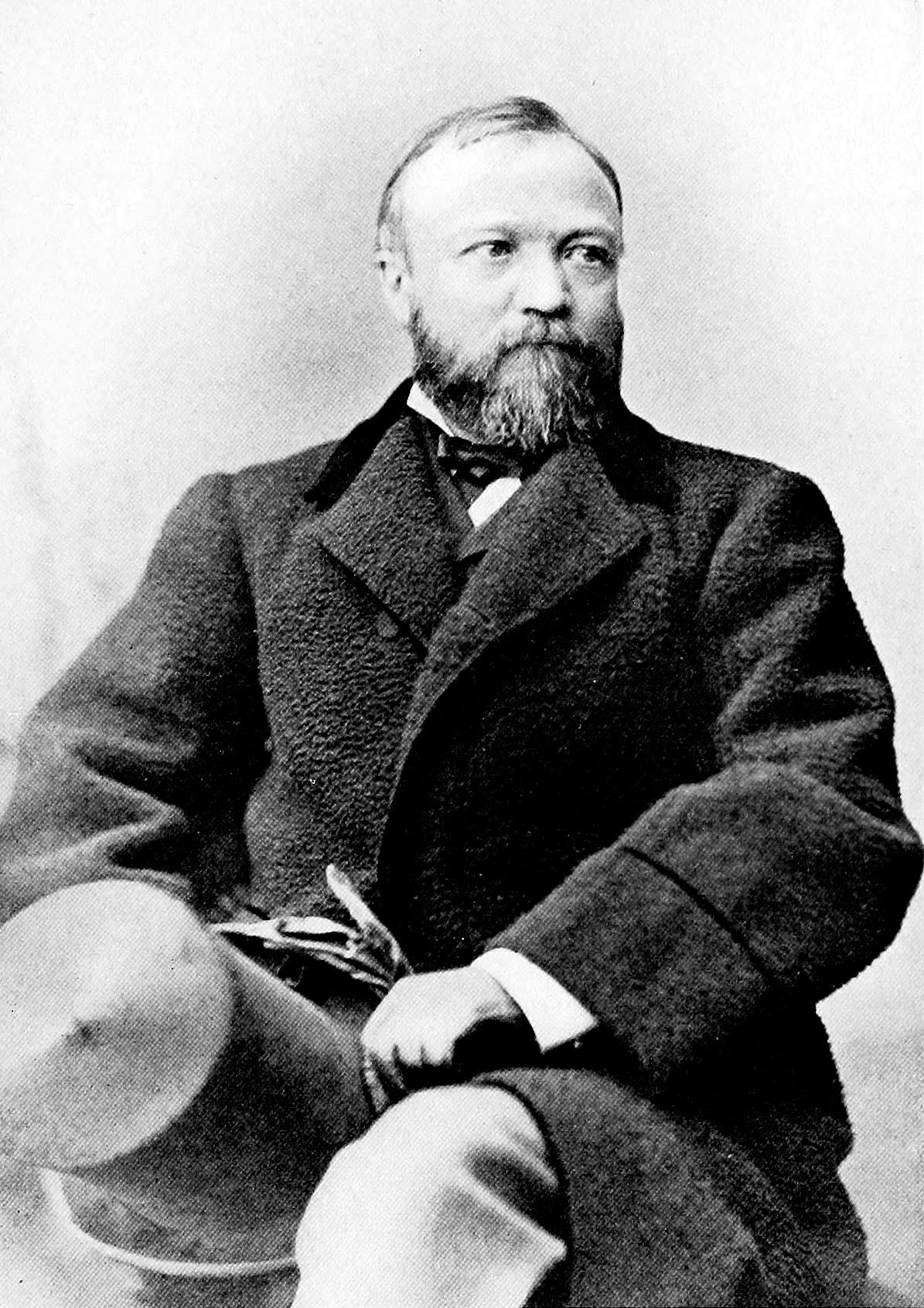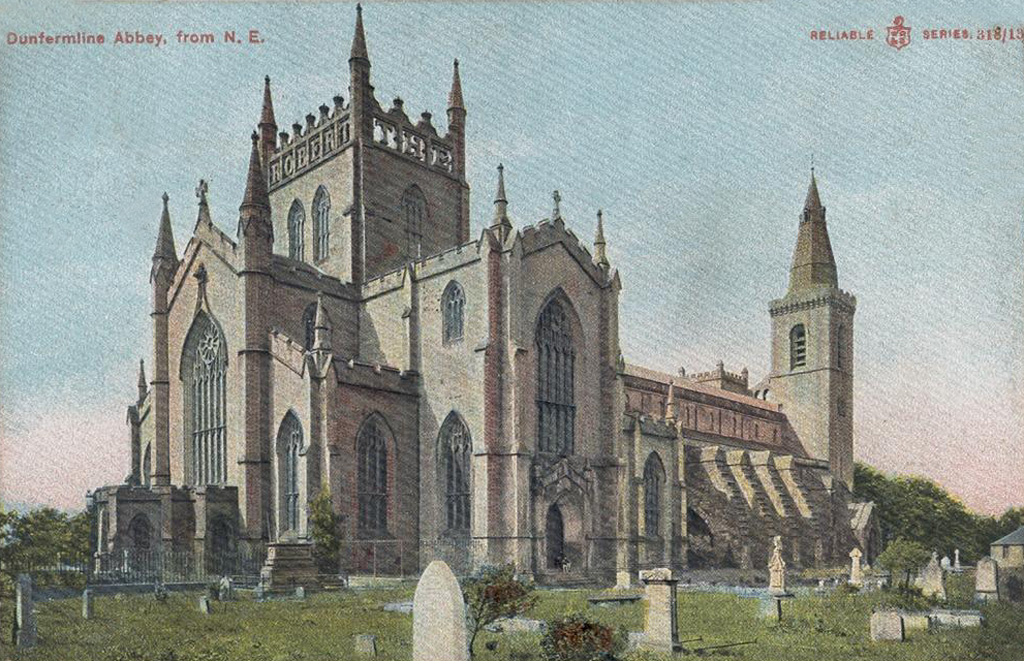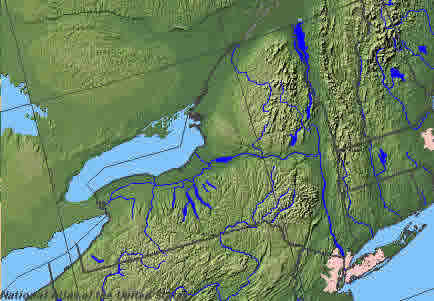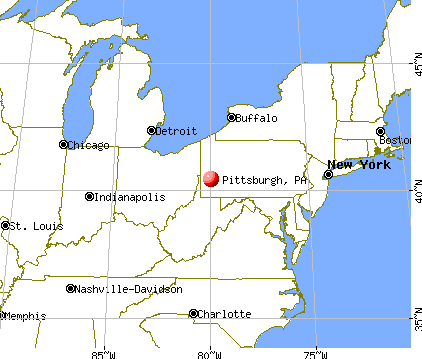|
|
Online Texts for Craig White's Literature Courses
|
|
|
selections from AUTOBIOGRAPHY OF ANDREW CARNEGIE
|
|
Instructor's note: Remembered by the public now primarily for "Carnegie Hall," Andrew Carnegie a century ago was known, as Bill Gates is today, as a great industrialist and philanthropist.
Carnegie's life, his writing of it, and combine two parallel narratives:
-
the immigrant narrative
-
American Dream as rags-to-riches with a variation earlier modeled by Benjamin Franklin: after making his great fortune, Carnegie devoted his wealth and work to philanthropy, implying that the wealthy should accumulate money not merely for their families but distribute it to develop the nation and its human potential.
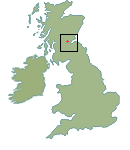
location of Dumferline, Scotland, Carnegie's birthplace
(Scotland is north of England on island of Britain; Ireland to west)
CHAPTER I
[1.1] .
. . To begin, then, I was born in Dunfermline
[large town in eastern
[1.2] My Grandfather Carnegie was well known throughout the district for his wit and humor, his genial nature and irrepressible spirits. . . .
[1.3] I think my optimistic nature, my ability to shed trouble and to laugh through life, making "all my ducks swans," as friends say I do, must have been inherited from this delightful old masquerading grandfather whose name I am proud to bear*. A sunny disposition is worth more than fortune. Young people should know that it can be cultivated; that the mind like the body can be moved from the shade into sunshine. . . . [*Carnegie's note (from J.B. Mackie, Andrew Carnegie: His Dunfermline Ties and Benefactions): "A 'brainy' man who read and thought for himself he became associated with the radical weavers of Dunfermline, who in Patiemuir formed a meeting-place which they named a college (Andrew was the 'Professor' of it) . . . "]
[1.4] On my mother's side the grandfather was even more marked,
for my grandfather Thomas Morrison was a friend of William Cobbett, a
contributor to his "Register," and in constant correspondence with him. Even as
I write, in
[1.5] Fortunate in my ancestors I was supremely so in my
birthplace. Where one is born is very important, for different surroundings and
traditions appeal to and stimulate different latent tendencies in the child.
Ruskin truly observes that every bright boy in
"The King sits in
[1.5 notes: Ruskin = John Ruskin (1819-1900), leading 19c English art & social critic; Malcolm Canmore (d. 1093), King of Scotland, is the Malcolm, son of Duncan, in Shakespeare's Macbeth; Malcolm's second wife, Margaret of Wessex (1045-93), was canonized in 1250; "Sir Patrick Spens" is a popular Scottish ballad concerning another Princess Margaret (of Norway)]
[1.6] The tomb of The Bruce is in the center of the Abbey, Saint
Margaret's tomb is near, and many of the "royal folk" lie sleeping close around.
Fortunate, indeed, the child who first sees the light in that romantic town,
which occupies high ground three miles north of the Firth of Forth, overlooking
the sea, with
[1.6 notes: "The Bruce" = Robert the Bruce (1274-1329), King of Scotland who led the wars of Scottish independence from England; "Ochils" = the Ochil Hills]
[1.7] The child privileged to develop amid such surroundings
absorbs poetry and romance with the air he breathes,
assimilates history and
tradition as he gazes around. These become to him his real world in
childhood—the ideal is the ever-present real. The actual has yet to come when,
later in life, he is launched into the workaday world of stern reality. Even
then, and till his last day, the early impressions remain, sometimes for short
seasons disappearing perchance, but only apparently driven away or suppressed.
They are always rising and coming again to the front to exert their influence,
to elevate his thought and color his life. No bright child of
[1.8] As my father succeeded in the weaving business we removed
from
[1.9] At this time I remember my cousin-brother, George Lauder ("Dod"), and myself were deeply impressed with the great danger overhanging us because a lawless flag was secreted in the garret. . . .
[1.10] My uncle, like all our family, was a moral-force man and
strong for obedience to law, but radical to the core and an intense admirer of
the
[1.11] One may imagine when all this was going on in public how bitter were the words that passed from one to the other in private. The denunciations of monarchical and aristocratic government, of privilege in all its forms, the grandeur of the republican system, the superiority of America, a land peopled by our own race, a home for freemen in which every citizen's privilege was every man's right—these were the exciting themes upon which I was nurtured. As a child I could have slain king, duke, or lord, and considered their deaths a service to the state and hence an heroic act.
[1.12] Such is the influence of childhood's earliest associations that it was long before I could trust myself to speak respectfully of any privileged class or person who had not distinguished himself in some good way and therefore earned the right to public respect [aristocracy v. meritocracy]. There was still the sneer behind for mere pedigree—"he is nothing, has done nothing, only an accident, a fraud strutting in borrowed plumes; all he has to his account is the accident of birth; the most fruitful part of his family, as with the potato, lies underground." I wondered that intelligent men could live where another human being was born to a privilege which was not also their birthright. . . . [birthright is relatable to "all men created equal with certain inalienable rights"]
[1.13] The change from hand-loom to steam-loom weaving was
disastrous to our family. My father did not recognize the impending revolution*,
and was struggling under the old system. His looms sank greatly in value, and it
became necessary for that power which never failed in any emergency—my mother—to
step forward and endeavor to repair the family fortune. She opened a small shop
in
[1.14] I remember that shortly after this I began to learn what poverty meant. . . .
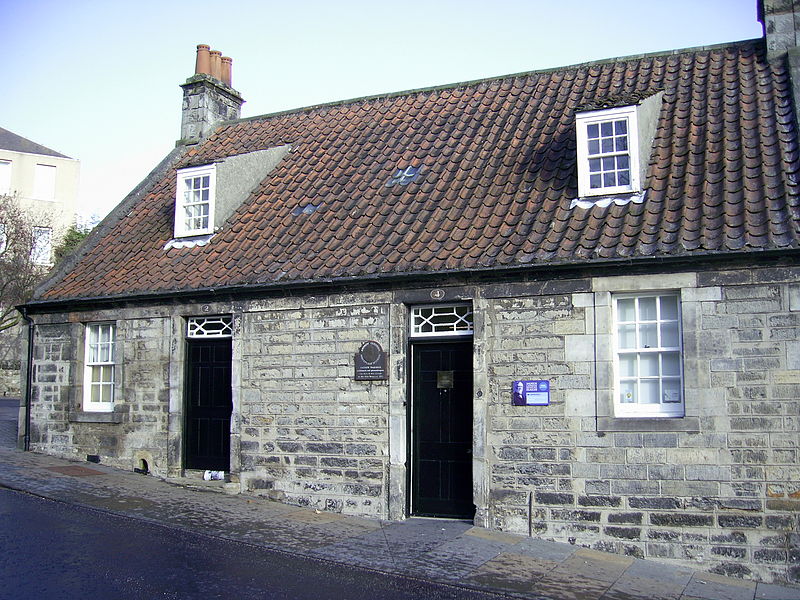
Andrew Carnegie birthplace (1835), Dumferline,
Scotland
![]()
CHAPTER II. DUNFERMLINE AND
[2.1] During my childhood the atmosphere around me was in a state of violent disturbance in matters theological as well as political. Along with the most advanced ideas which were being agitated in the political world—the death of privilege, the equality of the citizen, Republicanism—I heard many disputations upon theological subjects which the impressionable child drank in to an extent quite unthought of by his elders. I well remember that the stern doctrines of Calvinism lay as a terrible nightmare upon me, but that state of mind was soon over, owing to the influences of which I have spoken. I grew up treasuring within me the fact that my father had risen and left the Presbyterian Church one day when the minister preached the doctrine of infant damnation. This was shortly after I had made my appearance. ["Presbyterian Church . . . infant damnation" refers to Calvinist doctrine of predestination or determinism vs. "free will," a theology also maintained by the American Puritans and "Pilgrims"; cf. Protestant Work Ethic]
[2.2] Father could not stand it and said: "If that be your religion and that your God, I seek a better religion and a nobler God." He left the Presbyterian Church never to return, but he did not cease to attend various other churches. I saw him enter the closet every morning to pray and that impressed me. He was indeed a saint and always remained devout. All sects became to him as agencies for good. He had discovered that theologies were many, but religion was one. I was quite satisfied that my father knew better than the minister, who pictured not the Heavenly Father, but the cruel avenger of the Old Testament—an "Eternal Torturer" as Andrew D. White* ventures to call him in his autobiography. Fortunately this conception of the Unknown is now largely of the past. [*Andrew Dickson White (1832-1918), American educator and historian; author of A History of the Warfare of Science with Theology in Christendom (1896)]
[2.3] One of the chief enjoyments of my childhood was the keeping of pigeons and rabbits. I am grateful every time I think of the trouble my father took to build a suitable house for these pets. Our home became headquarters for my young companions. My mother was always looking to home influences as the best means of keeping her two boys in the right path. She used to say that the first step in this direction was to make home pleasant; and there was nothing she and my father would not do to please us and the neighbors' children who centered about us.
[2.4] My first business venture was securing my companions' services for a season as an employer, the compensation being that the young rabbits, when such came, should be named after them. The Saturday holiday was generally spent by my flock in gathering food for the rabbits. My conscience reproves me to-day, looking back, when I think of the hard bargain I drove with my young playmates, many of whom were content to gather dandelions and clover for a whole season with me, conditioned upon this unique reward—the poorest return ever made to labor. Alas! what else had I to offer them! Not a penny.
[2.5] I treasure the remembrance of this plan as the earliest
evidence of organizing power upon the development of which my material success
in life has hung—a success not to be attributed to what I have known or done
myself, but to the faculty of knowing and choosing others who did know better
than myself. Precious knowledge this for any man to possess. I did not
understand steam machinery, but I tried to understand that much more complicated
piece of mechanism—man. Stopping at a small
[2.6] With the introduction and improvement of steam machinery, trade grew worse and worse in Dunfermline for the small manufacturers, and at last a letter was written to my mother's two sisters in Pittsburgh stating that the idea of our going to them was seriously entertained—not, as I remember hearing my parents say, to benefit their own condition, but for the sake of their two young sons. Satisfactory letters were received in reply. The decision was taken to sell the looms and furniture by auction. And my father's sweet voice sang often to mother, brother, and me:
[2.7] "To the West, to the West, to the land of the free,
Where the mighty
[2.8] The proceeds of the sale were most disappointing. The looms
brought hardly anything, and the result was that twenty pounds more were needed
to enable the family to pay passage to
[2.9] I had left school forever, with the exception of
one winter's night-schooling in
[2.9 notes: "Wallace" = William Wallace (d. 1305), a.k.a. "Braveheart," hero of Scottish independence; "The Bruce" = Robert the Bruce (1274-1329), King of Scotland who led the wars of Scottish independence from England; "Burns" = Robert Burns (1759-96), national poet of Scotland; "Arabian Nights" = One Thousand and One Nights, collection of West & South Asian folk tales, first published in English in 1706]
[2.10] On the morning of the day we started from beloved
Dunfermline, in the omnibus that ran upon the coal railroad to
|
Dumferline Abbey, early 1900s |
|
[2.11] We were rowed over in a small boat to the
[2.12] We sailed from the Broomielaw of Glasgow in the 800-ton sailing ship Wiscasset*. During the seven weeks of the voyage, I came to know the sailors quite well, learned the names of the ropes, and was able to direct the passengers to answer the call of the boatswain, for the ship being undermanned, the aid of the passengers was urgently required. In consequence I was invited by the sailors to participate on Sundays, in the one delicacy of the sailors' mess, plum duff [pudding]. I left the ship with sincere regret. [*Wiscasset = Abenaki Indian name for harbor town in Maine, USA]
[2.13] The arrival at
[2.14] He took me to a refreshment stand and ordered a glass of sarsaparilla for me, which I drank with as much relish as if it were the nectar of the gods. To this day nothing that I have ever seen of the kind rivals the image which remains in my mind of the gorgeousness of the highly ornamented brass vessel out of which that nectar came foaming. Often as I have passed the identical spot I see standing there the old woman's sarsaparilla stand, and I marvel what became of the dear old sailor. I have tried to trace him, but in vain, hoping that if found he might be enjoying a ripe old age, and that it might be in my power to add to the pleasure of his declining years. He was my ideal Tom Bowling*, and when that fine old song is sung I always see as the "form of manly beauty" my dear old friend Barryman. Alas! ere this he's gone aloft. Well; by his kindness on the voyage he made one boy his devoted friend and admirer. [*"The Death of Tom Bowling," a popular song of late 1700s by Charles Dibdin, written on death of his brother at sea.]
[2.15] We knew only Mr. and Mrs. Sloane in
[2.16] My father was induced by emigration agents
in New York to
take the Erie Canal by way of Buffalo and Lake Erie to Cleveland, and thence
down the canal to Beaver [in Pennsylvania]—a journey which then lasted three weeks, and is made to-day by rail in ten hours. There was no
railway communication then with
|
|
|
[2.17] Our friends in
[2.18] As usual, my mother came to the rescue. There was no
keeping her down. In her youth she had learned to bind shoes
[cf. 1.4] in her father's
business for pin-money, and the skill then acquired was now turned to account
for the benefit of the family. Mr. Phipps, father of my friend and partner Mr.
Henry Phipps, was, like my grandfather, a master shoemaker. He was our neighbor
in
[2.19] This is where the children of honest poverty [American Dream] have the most precious of all advantages over those of wealth. The mother, nurse, cook, governess, teacher, saint, all in one; the father, exemplar, guide, counselor, and friend! Thus were my brother and I brought up. What has the child of millionaire or nobleman that counts compared to such a heritage?
[2.20] My mother was a busy woman, but all her work did not prevent her neighbors from soon recognizing her as a wise and kindly woman whom they could call upon for counsel or help in times of trouble. Many have told me what my mother did for them. So it was in after years wherever we resided; rich and poor came to her with their trials and found good counsel. She towered among her neighbors wherever she went.
![]()
CHAPTER III.
[3.1] The great question now was, what could be found for me to do. I had just completed my thirteenth year, and I fairly panted to get to work that I might help the family to a start in the new land. The prospect of want had become to me a frightful nightmare. My thoughts at this period centered in the determination that we should make and save enough of money to produce three hundred dollars a year—twenty-five dollars monthly, which I figured was the sum required to keep us without being dependent upon others. Every necessary thing was very cheap in those days.
[3.2] The brother of my Uncle Hogan would often ask what my parents meant to do with me, and one day there occurred the most tragic of all scenes I have ever witnessed. Never can I forget it. He said, with the kindest intentions in the world, to my mother, that I was a likely boy and apt to learn; and he believed that if a basket were fitted out for me with knickknacks to sell, I could peddle them around the wharves and make quite a considerable sum. I never knew what an enraged woman meant till then. My mother was sitting sewing at the moment, but she sprang to her feet with outstretched hands and shook them in his face.
[3.3] "What! my son a peddler and go among rough men upon the
wharves! I would rather throw him into the
[3.4] She stood a tragic queen. The next moment she had broken down, but only for a few moments did tears fall and sobs come. Then she took her two boys in her arms and told us not to mind her foolishness. There were many things in the world for us to do and we could be useful men, honored and respected, if we always did what was right. . . .
[3.5] Soon after this incident my father found it necessary to
give up hand-loom weaving and to enter the cotton factory of Mr. Blackstock, an
old Scotsman in
[3.6] One day the chance came. Mr. Hay had to make out some bills. He had no clerk, and was himself a poor penman. He asked me what kind of hand I could write, and gave me some writing to do. The result pleased him, and he found it convenient thereafter to let me make out his bills. I was also good at figures; and he soon found it to be to his interest—and besides, dear old man, I believe he was moved by good feeling toward the white-haired boy, for he had a kind heart and was Scotch and wished to relieve me from the engine [steam-loom]—to put me at other things, less objectionable except in one feature.
[3.7] It now became my duty to bathe the newly made spools in vats of oil. Fortunately there was a room reserved for this purpose and I was alone, but not all the resolution I could muster, nor all the indignation I felt at my own weakness, prevented my stomach from behaving in a most perverse way. I never succeeded in overcoming the nausea produced by the smell of the oil. . . .
[3.8] My service with Mr. Hay was a distinct advance upon the
cotton factory, and I also made the acquaintance of an employer who was very
kind to me. Mr. Hay kept his books in single entry, and I was able to handle
them for him; but hearing that all great firms kept their books in double entry,
and after talking over the matter with my companions, John Phipps, Thomas N.
Miller, and William Cowley, we all determined to attend night school during the
winter and learn the larger system. So the four of us went to a Mr. Williams in
[3.9] One evening, early in 1850, when I returned home from work, I was told that Mr. David Brooks, manager of the telegraph office, had asked my Uncle Hogan if he knew where a good boy could be found to act as messenger. Mr. Brooks and my uncle were enthusiastic draught-players*, and it was over a game of draughts* that this important inquiry was made. Upon such trifles do the most momentous consequences hang. A word, a look, an accent, may affect the destiny not only of individuals, but of nations. . . . [*draughts = checkers]
[3.10] My uncle mentioned my name, and said he would see whether I would take the position. I remember so well the family council that was held. Of course I was wild with delight. No bird that ever was confined in a cage longed for freedom more than I. Mother favored, but father was disposed to deny my wish. It would prove too much for me, he said; I was too young and too small. For the two dollars and a half per week offered it was evident that a much larger boy was expected. Late at night I might be required to run out into the country with a telegram, and there would be dangers to encounter. Upon the whole my father said that it was best that I should remain where I was. He subsequently withdrew his objection, so far as to give me leave to try, and I believe he went to Mr. Hay and consulted with him. Mr. Hay thought it would be for my advantage, and although, as he said, it would be an inconvenience to him, still he advised that I should try, and if I failed he was kind enough to say that my old place would be open for me.
[3.11] This being decided, I was asked to go over the river to
[3.12] I was dressed in my one white linen shirt, which was usually kept sacred for the Sabbath day, my blue round-about, and my whole Sunday suit. I had at that time, and for a few weeks after I entered the telegraph service, but one linen suit of summer clothing; and every Saturday night, no matter if that was my night on duty and I did not return till near midnight, my mother washed those clothes and ironed them, and I put them on fresh on Sabbath morning. There was nothing that heroine did not do in the struggle we were making for elbow room in the western world. Father's long factory hours tried his strength, but he, too, fought the good fight like a hero and never failed to encourage me.
[3.13] The interview was successful. I took care to explain that I
did not know
[3.14] And that is how in 1850 I got my first real start in life. From the dark cellar running a steam-engine at two dollars a week, begrimed with coal dirt, without a trace of the elevating influences of life, I was lifted into paradise, yes, heaven, as it seemed to me, with newspapers, pens, pencils, and sunshine about me. There was scarcely a minute in which I could not learn something or find out how much there was to learn and how little I knew. I felt that my foot was upon the ladder and that I was bound to climb. . . .

(symbol of American Dream / rags-to-riches as
ladder [3.14 above])
![]()
CHAPTER IV. COLONEL ANDERSON AND BOOKS
[4.1] With all their pleasures the messenger boys were hard worked. Every other evening they were required to be on duty until the office closed, and on these nights it was seldom that I reached home before eleven o'clock. On the alternating nights we were relieved at six. This did not leave much time for self-improvement, nor did the wants of the family leave any money to spend on books. There came, however, like a blessing from above, a means by which the treasures of literature were unfolded to me.
[4.2] Colonel James Anderson—I bless his name as I write—announced that he would open his library of four hundred volumes to boys, so that any young man could take out, each Saturday afternoon, a book which could be exchanged for another on the succeeding Saturday. My friend, Mr. Thomas N. Miller, reminded me recently that Colonel Anderson's books were first opened to "working boys," and the question arose whether messenger boys, clerks, and others, who did not work with their hands, were entitled to books. My first communication to the press was a note, written to the "Pittsburgh Dispatch," urging that we should not be excluded; that although we did not now work with our hands, some of us had done so, and that we were really working boys. Dear Colonel Anderson promptly enlarged the classification. So my first appearance as a public writer was a success. [Colonel James Anderson (1785-1861) was a Pennsylvania industrialist who founded “The JAMES ANDERSON Library and Institute of Allegheny City” in 1850.]
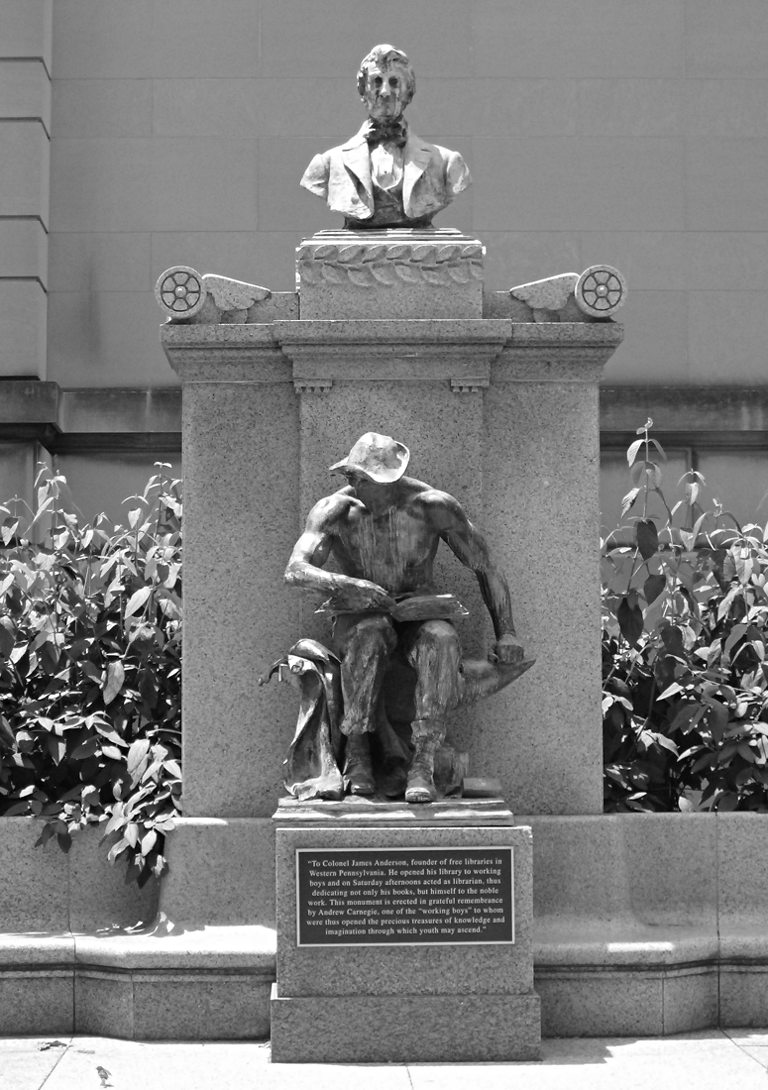
Labor Reading
(1904) by Daniel Chester French (1850-1931)
monument commissioned by Andrew Carnegie
to honor James Anderson
[4.3] My dear friend, Tom Miller, one of the inner circle, lived
near Colonel Anderson and introduced me to him, and in this way the windows were
opened in the walls of my dungeon through which the light of knowledge streamed
in. Every day's toil and even the long hours of night service were lightened by
the book which I carried about with me and read in the intervals that could be
snatched from duty. And the future was made bright by the thought that when
Saturday came a new volume could be obtained. In this way I became familiar with
Macaulay's essays and his history, and with Bancroft's "History of the
[4.3 notes: Bancroft's "History of the
[4.4] This is but a slight tribute and gives only a faint idea of the depth of gratitude which I feel for what he did for me and my companions. It was from my own early experience that I decided there was no use to which money could be applied so productive of good to boys and girls who have good within them and ability and ambition to develop it, as the founding of a public library in a community which is willing to support it as a municipal institution. I am sure that the future of those libraries I have been privileged to found will prove the correctness of this opinion. For if one boy in each library district, by having access to one of these libraries, is half as much benefited as I was by having access to Colonel Anderson's four hundred well-worn volumes, I shall consider they have not been established in vain. . . . [images of Carnegie libraries]
![]()
CHAPTER VI. RAILROAD SERVICE
[6.1] From the operating-room of the telegraph office I had now stepped into the open world, and the change at first was far from agreeable. I had just reached my eighteenth birthday, and I do not see how it could be possible for any boy to arrive at that age much freer from a knowledge of anything but what was pure and good. I do not believe, up to that time, I had ever spoken a bad word in my life and seldom heard one. I knew nothing of the base and the vile. Fortunately I had always been brought in contact with good people.
[6.2] I was now plunged at once into the company of coarse men, for the office was temporarily only a portion of the shops and the headquarters for the freight conductors, brakemen, and firemen. All of them had access to the same room with Superintendent Scott and myself, and they availed themselves of it. This was a different world, indeed, from that to which I had been accustomed. I was not happy about it. I ate, necessarily, of the fruit of the tree of knowledge of good and evil for the first time. But there were still the sweet and pure surroundings of home, where nothing coarse or wicked ever entered, and besides, there was the world in which I dwelt with my companions, all of them refined young men, striving to improve themselves and become respected citizens. I passed through this phase of my life detesting what was foreign to my nature and my early education. The experience with coarse men was probably beneficial because it gave me a "scunner" (disgust), to use a Scotism, at chewing or smoking tobacco, also at swearing or the use of improper language, which fortunately remained with me through life. . . .
[6.3] During these years of which I have been writing,
the family
fortunes had been steadily improving. My thirty-five dollars a month had grown
to forty, an unsolicited advance having been made by Mr. Scott. It was part of
my duty to pay the men every month. We used checks
upon the bank and I drew my salary invariably in two twenty-dollar gold pieces.
They seemed to me the prettiest works of art in the world. It was decided in
family council that we could venture to buy the lot and the two small frame
houses upon it, in one of which we had lived, and the other, a four-roomed
house, which till then had been occupied by my Uncle and Aunt Hogan, who had
removed elsewhere. It was through the aid of my dear Aunt Aitken that we had
been placed in the small house above the weaver's shop, and it was now our turn
to be able to ask her to return to the house that formerly had been her own. In
the same way after we had occupied the four-roomed house, Uncle Hogan having
passed away, we were able to restore Aunt Hogan to her old home when we removed
to
[6.4] Father's death threw upon me the management of affairs to a
greater extent than ever. Mother kept on the binding of shoes; Tom went steadily
to the public school; and I continued with Mr. Scott in the service of the
railroad company. Just at this time Fortunatus knocked at our door. Mr. Scott
asked me if I had five hundred dollars. If so, he said he wished to make an
investment for me. Five hundred cents was much nearer my capital. I certainly
had not fifty dollars saved for investment, but I was not going to miss the
chance of becoming financially connected with my leader and great man. So I said
boldly I thought I could manage that sum. He then told me that there were ten
shares of Adams Express stock that he could buy, which had belonged to a station
agent, Mr. Reynolds, of
[6.5] This was my first investment. In those good old days monthly dividends were more plentiful than now and Adams
Express paid a monthly dividend. One morning a white envelope was lying upon my
desk, addressed in a big John Hancock hand, to "Andrew Carnegie, Esquire."
"Esquire" tickled the boys and me inordinately. At one corner was seen the round
stamp of Adams Express Company. I opened the envelope. All it contained was a
check for ten dollars upon the Gold Exchange Bank of
![]()
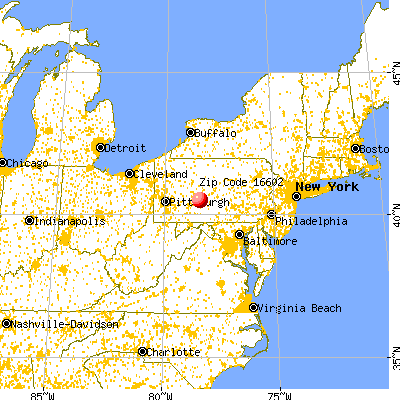
Altoona PA indicated by red dot
CHAPTER VII. SUPERINTENDENT OF THE
[Instructor's note: In 1859 Carnegie is superintendent of the Pittsburgh Division of the Pennsylvania Railroad]
[7.1] One night, as I was walking home in the dark, I became aware that a man was following me. By and by he came up to me and said:
[7.2] "I must not be seen with you, but you did me a favor once
and I then resolved if ever I could serve you I would do it. I called at the
office in
[7.3] I listened and he went on to say that a paper was being rapidly signed by the shopmen, pledging themselves to strike on Monday next. There was no time to be lost. I told Mr. Scott in the morning and he at once had printed notices posted in the shops that all men who had signed the paper, pledging themselves to strike, were dismissed and they should call at the office to be paid. A list of the names of the signers had come into our possession in the meantime, and this fact was announced. Consternation followed and the threatened strike was broken.
[7.4] I have had many incidents, such as that of the blacksmith, in my life. Slight attentions or a kind word to the humble often bring back reward as great as it is unlooked for. No kind action is ever lost. Even to this day I occasionally meet men whom I had forgotten, who recall some trifling attention I have been able to pay them, especially when in charge at Washington of government railways and telegraphs during the Civil War, when I could pass people within the lines—a father helped to reach a wounded or sick son at the front, or enabled to bring home his remains, or some similar service. I am indebted to these trifles for some of the happiest attentions and the most pleasing incidents of my life. And there is this about such actions: they are disinterested, and the reward is sweet in proportion to the humbleness of the individual whom you have obliged. It counts many times more to do a kindness to a poor working-man than to a millionaire, who may be able some day to repay the favor. How true Wordsworth's lines:
"That best portion of a good man's life—His little, nameless, unremembered acts / Of kindness and of love." . . . [from Wordsworth, Tintern Abbey (1798)]
[7.5] One important change in our life at
[7.6] Among the manifold blessings I have to be thankful for is that neither nurse nor governess was my companion in infancy. No wonder the children of the poor are distinguished for the warmest affection and the closest adherence to family ties and are characterized by a filial regard far stronger than that of those who are mistakenly called more fortunate in life. They have passed the impressionable years of childhood and youth in constant loving contact with father and mother, to each they are all in all, no third person coming between. The child that has in his father a teacher, companion, and counselor, and whose mother is to him a nurse, seamstress, governess, teacher, companion, heroine, and saint all in one, has a heritage to which the child of wealth remains a stranger. . . .
[7.7] Upon our return to
[7.8] Here a new life was opened to us. There were country lanes and gardens in abundance. Residences had from five to twenty acres of land about them. The Homewood Estate was made up of many hundreds of acres, with beautiful woods and glens and a running brook. We, too, had a garden and a considerable extent of ground around our house. The happiest years of my mother's life were spent here among her flowers and chickens and the surroundings of country life. Her love of flowers was a passion. She was scarcely ever able to gather a flower. Indeed I remember she once reproached me for pulling up a weed, saying "it was something green." I have inherited this peculiarity and have often walked from the house to the gate intending to pull a flower for my button-hole and then left for town unable to find one I could destroy.
[7.9] With this change to the country came a whole host of new acquaintances. Many of the wealthy families of the district had their residences in this delightful suburb. It was, so to speak, the aristocratic quarter. To the entertainments at these great houses the young superintendent was invited. The young people were musical and we had musical evenings a plenty. I heard subjects discussed which I had never known before, and I made it a rule when I heard these to learn something about them at once. I was pleased every day to feel that I was learning something new. . . .
![]()
CHAPTER X. THE IRON WORKS
[10.1] The Keystone Works have always been my pet as being the parent of all the other works. But they had not been long in existence before the advantage of wrought- over cast-iron became manifest. Accordingly, to insure uniform quality, and also to make certain shapes which were not then to be obtained, we determined to embark in the manufacture of iron. My brother and I became interested with Thomas N. Miller, Henry Phipps, and Andrew Kloman in a small iron mill. Miller was the first to embark with Kloman and he brought Phipps in, lending him eight hundred dollars to buy a one-sixth interest, in November, 1861.
[10.2] I must not fail to record that Mr. Miller was the pioneer
of our iron manufacturing projects. We were all indebted to Tom, who still lives
(July 20, 1911) and sheds upon us the sweetness and light of a most lovable
nature, a friend who grows more precious as the years roll by. He has softened
by age, and even his outbursts against theology as antagonistic to true religion
are in his fine old age much less alarming. We are all prone to grow philosophic
in age, and perhaps this is well. [Carnegie's
note: In re-reading this—July 19, 1912—in our retreat upon the high
moors at Aultnagar, I drop a tear for my bosom friend, dear Tom Miller, who died
in
[10.3] Andrew Kloman had a small steel-hammer in
[10.4] How much this German created! He was the first man to
introduce the cold saw that cut cold iron the exact lengths. He invented
upsetting machines to make bridge links, and also built the first "universal"
mill in
[10.5] It was in 1862 that the great oil wells of
[10.6] What surprised me was the good humor which prevailed
everywhere. It was a vast picnic, full of amusing incidents. Everybody was in
high glee; fortunes were supposedly within reach; everything was booming. On the
tops of the derricks floated flags on which strange mottoes were displayed. I
remember looking down toward the river and seeing two men working their treadles
boring for oil upon the banks of the stream, and inscribed upon their flag was
"Hell or
[10.7] The adaptability of the American was never better displayed than in this region. Order was soon evolved out of chaos. When we visited the place not long after we were serenaded by a brass band the players of which were made up of the new inhabitants along the creek. It would be safe to wager that a thousand Americans in a new land would organize themselves, establish schools, churches, newspapers, and brass bands—in short, provide themselves with all the appliances of civilization—and go ahead developing their country before an equal number of British would have discovered who among them was the highest in hereditary rank and had the best claims to leadership owing to his grandfather. There is but one rule among Americans—the tools to those who can use them. . . .
![]()
CHAPTER XIII. THE AGE OF STEEL
[13.1] Looking back today it seems incredible that only forty
years ago (1870) chemistry in the
[13.2] The Lucy Furnace was out of one trouble and into another, owing to the great variety of ores, limestone, and coke which were then supplied with little or no regard to their component parts. This state of affairs became intolerable to us. We finally decided to dispense with the rule-of-thumb-and-intuition manager, and to place a young man in charge of the furnace. We had a young shipping clerk, Henry M. Curry, who had distinguished himself, and it was resolved to make him manager. . . .
[13.3] The next step taken was to find a chemist as Mr. Curry's assistant and guide. We found the man in a learned German, Dr. Fricke, and great secrets did the doctor open up to us. Iron stone from mines that had a high reputation was now found to contain ten, fifteen, and even twenty per cent less iron than it had been credited with. Mines that hitherto had a poor reputation we found to be now yielding superior ore. The good was bad and the bad was good, and everything was topsy-turvy. Nine tenths of all the uncertainties of pig-iron making were dispelled under the burning sun of chemical knowledge. . . .
![]()
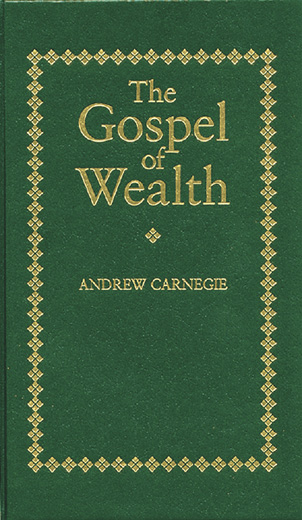
CHAPTER XIX. THE "GOSPEL OF WEALTH"
[19.1] After my book, "The Gospel of Wealth," was published, it was inevitable that I should live up to its teachings by ceasing to struggle for more wealth. I resolved to stop accumulating and begin the infinitely more serious and difficult task of wise distribution. Our profits had reached forty millions of dollars per year and the prospect of increased earnings before us was amazing. Our successors, the United States Steel Corporation, soon after the purchase, netted sixty millions in one year. Had our company continued in business and adhered to our plans of extension, we figured that seventy millions in that year might have been earned. . . .
[19.2] One day my eyes happened to see a line in that most valuable paper, the "Scottish American," in which I had found many gems. This was the line:
"The gods send thread for a web begun."
[19.3] It seemed almost as if it had been sent directly to me.
This sank into my heart, and I resolved to begin at once my first web. True
enough, the gods sent thread in the proper form. Dr. J.S. Billings, of the New
York Public Libraries, came as their agent, and of dollars, five and a quarter
millions went at one stroke for sixty-eight branch libraries, promised for
[19.4] My father, as I have stated, had been one of the five
pioneers in
[images of Carnegie libraries]
![]()
CHAPTER XX. EDUCATIONAL AND PENSION FUNDS
[20.1] The fifteen-million-dollar pension fund for aged university professors (The Carnegie Endowment for the Advancement of Learning), the fourth important gift, given in June, 1905, required the selection of twenty-five trustees from among the presidents of educational institutions in the United States. . . .
[20.2] This fund is very near and dear to me—knowing, as I do,
many who are soon to become beneficiaries, and convinced as I am of their worth
and the value of the service already rendered by them. Of all professions, that
of teaching is probably the most unfairly, yes, most meanly paid, though it
should rank with the highest. Educated men, devoting their lives to teaching the
young, receive mere pittances. When I first took my seat as a trustee of
[20.3] My giving of organs to churches came very early in my
career, I having presented to less than a hundred members of the
[20.4] Of all my work of a philanthropic character, my private pension fund gives me the highest and noblest return. No satisfaction equals that of feeling you have been permitted to place in comfortable circumstances, in their old age, people whom you have long known to be kind and good and in every way deserving, but who from no fault of their own, have not sufficient means to live respectably, free from solicitude as to their mere maintenance. Modest sums insure this freedom. It surprised me to find how numerous were those who needed some aid to make the difference between an old age of happiness and one of misery. Some such cases had arisen before my retirement from business, and I had sweet satisfaction from this source. Not one person have I ever placed upon the pension list* that did not fully deserve assistance. It is a real roll of honor and mutual affection. All are worthy. There is no publicity about it. No one knows who is embraced. Not a word is ever breathed to others. [Carnegie's note: This amounted to over $250,000 a year.]
[20.5] This is my favorite and best answer to the question which will never down in my thoughts: "What good am I doing in the world to deserve all my mercies?" Well, the dear friends of the pension list give me a satisfactory reply, and this always comes to me in need. I have had far beyond my just share of life's blessings; therefore I never ask the Unknown for anything. We are in the presence of universal law and should bow our heads in silence and obey the Judge within, asking nothing, fearing nothing, just doing our duty right along, seeking no reward here or hereafter.
[20.6] It is, indeed, more blessed to give than to receive. . . .
![]()
CHAPTER XXI. THE
[21.1] I became interested in the Peace Society of Great Britain upon one of my early visits and attended many of its meetings, and in later days I was especially drawn to the Parliamentary Union established by Mr. Cremer, the famous working-man's representative in Parliament. Few men living can be compared to Mr. Cremer. When he received the Nobel Prize of £8000 as the one who had done the most that year for peace, he promptly gave all but £1000, needed for pressing wants, to the Arbitration Committee. It was a noble sacrifice. What is money but dross to the true hero! . . .
[21.2] I had the great pleasure of presenting the Committee to
President Cleveland at
See also Andrew Carnegie, "Wealth," North American Review (June 1889)
[Chapter XXI also covers restoration of Pittencrieff including gardens near Carnegie's birthplace of Dumferline, Scotland:
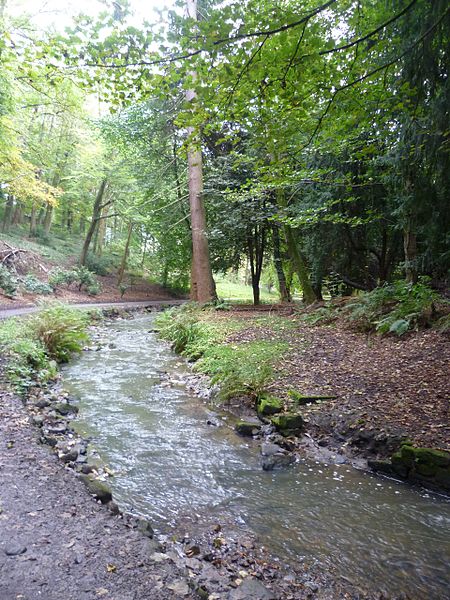
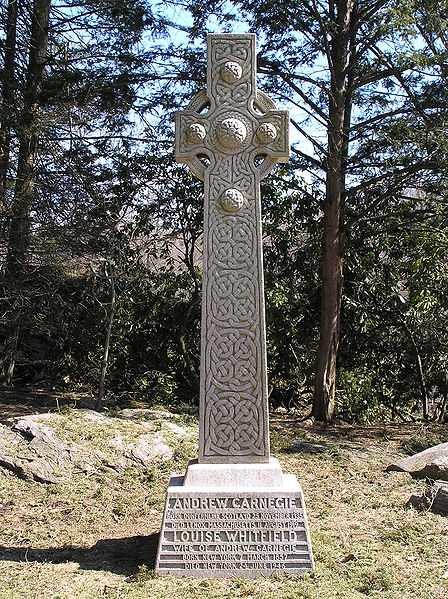
Carnegie's gravesite at Sleepy Hollow Cemetery,
Concord MA



